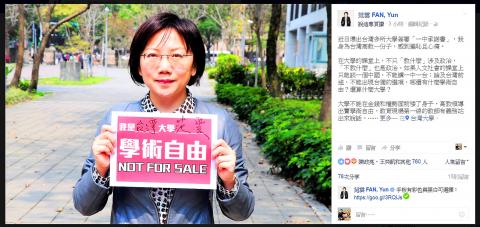A Taiwanese professor on Sunday launched a petition to protect academic freedom following allegations last week that a majority of the nation’s universities signed letters agreeing to censor topics Beijing deems offensive.
Shih Hsin University on Thursday last week was accused of signing a letter promising Chinese universities that its faculty would not discuss sensitive political topics in classes offered to Chinese exchange students, such as “one China, one Taiwan,” “two Chinas” and Taiwanese independence.
The Ministry of Education said a preliminary investigation revealed that at least 80 Taiwanese universities have signed similar agreements and that a full investigation is to be conducted in the next two weeks.

Photo: screengrab from Facebook
Fan Yun (范雲), a National Taiwan University sociology professor and the Social Democratic Party (SDP) convener, called on professors to petition against political restrictions imposed on them by universities.
“As a teacher in Taiwanese higher education, I feel ashamed and heartbroken. In a university classroom, what one teaches and refrains from teaching are both political actions. If humanities education … is obliged to negate Taiwanese independence in discussions about Taiwan’s future, we have no such thing as academic freedom in universities,” she said on Facebook.
Fan said the scandal is a “crisis of Taiwanese democracy,” adding that universities have a duty to safeguard academic discourse and research freedoms, but the incident shows that half the nation’s institutions are prepared to sacrifice those principles.
“There is no such thing as apolitical academic discourse. Marking any topic as beyond the pale of learning or discussion is in itself politically manipulative,” she said, adding that universities that do not honor academic freedom are “no better than counterfeit food products.”
A number of university faculties and student organizations have participated in Fan’s movement by signing the petition and posting photographs displaying their names, institutions and the message “academic freedom is not for sale.”
Former Shih Hsin University president Lai Ting-ming (賴鼎銘) and professor Chen Cheng-liang (陳政亮), have signed the petition.
The National Taiwan University Student Association and the National Taiwan University Graduate Student Association issued a joint statement condemning the agreements, saying that they compromise academic freedom, limit exchange students learning experience and destroy the integrity of cross-strait academic exchanges.
“Academic freedom is a right guaranteed by the University Act (大學法) and should not be abridged because university administrators are afraid of China,” they said.
Resurrecting censorship on campus is offensive to the democracy advocates and dissidents who died during the Martial Law era, they added.

Beijing could eventually see a full amphibious invasion of Taiwan as the only "prudent" way to bring about unification, the US Department of Defense said in a newly released annual report to Congress. The Pentagon's "Annual Report to Congress: Military and Security Developments Involving the People's Republic of China 2025," was in many ways similar to last year’s report but reorganized the analysis of the options China has to take over Taiwan. Generally, according to the report, Chinese leaders view the People's Liberation Army's (PLA) capabilities for a Taiwan campaign as improving, but they remain uncertain about its readiness to successfully seize

Taiwan is getting a day off on Christmas for the first time in 25 years. The change comes after opposition parties passed a law earlier this year to add or restore five public holidays, including Constitution Day, which falls on today, Dec. 25. The day marks the 1947 adoption of the constitution of the Republic of China, as the government in Taipei is formally known. Back then the Chinese Nationalist Party (KMT) governed China from Nanjing. When the KMT, now an opposition party in Taiwan, passed the legislation on holidays, it said that they would help “commemorate the history of national development.” That

Trips for more than 100,000 international and domestic air travelers could be disrupted as China launches a military exercise around Taiwan today, Taiwan’s Civil Aviation Administration (CAA) said yesterday. The exercise could affect nearly 900 flights scheduled to enter the Taipei Flight Information Region (FIR) during the exercise window, it added. A notice issued by the Chinese Civil Aviation Administration showed there would be seven temporary zones around the Taiwan Strait which would be used for live-fire exercises, lasting from 8am to 6pm today. All aircraft are prohibited from entering during exercise, it says. Taipei FIR has 14 international air routes and

Snow fell on Yushan (Jade Mountain, 玉山) yesterday morning as a continental cold air mass sent temperatures below freezing on Taiwan’s tallest peak, the Central Weather Administration (CWA) said. Snowflakes were seen on Yushan’s north peak from 6:28am to 6:38am, but they did not fully cover the ground and no accumulation was recorded, the CWA said. As of 7:42am, the lowest temperature recorded across Taiwan was minus-5.5°C at Yushan’s Fengkou observatory and minus-4.7°C at the Yushan observatory, CWA data showed. On Hehuanshan (合歡山) in Nantou County, a low of 1.3°C was recorded at 6:39pm, when ice pellets fell at Songsyue Lodge (松雪樓), a